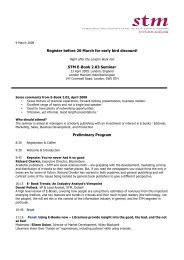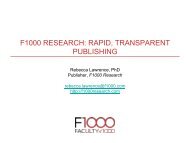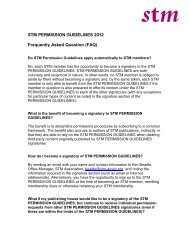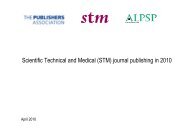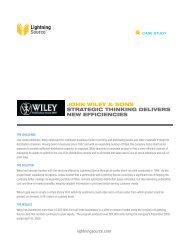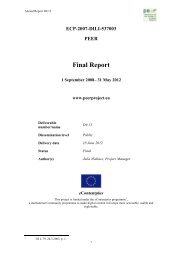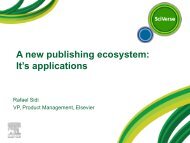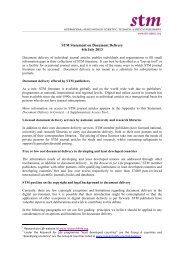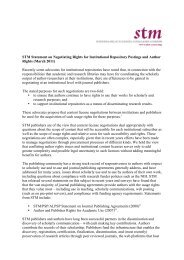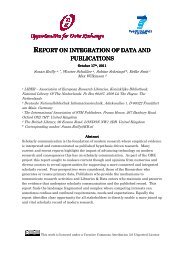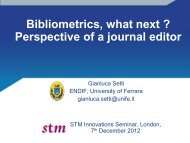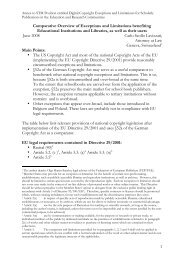What is the research layer? - STM
What is the research layer? - STM
What is the research layer? - STM
Create successful ePaper yourself
Turn your PDF publications into a flip-book with our unique Google optimized e-Paper software.
“Flat” Scholarship and<br />
Research
Level 1<br />
• Card Archives Scholarly University Even catalogs more digitized blogging web <strong>research</strong> searchable projects<br />
• online User More Large-scale database generated <strong>research</strong> book databases content digitizing<br />
• 24-hour L<strong>is</strong>tservs Large Data Google set books<br />
academic access postings to portals<br />
information<br />
•<br />
Library Open Government Massive<br />
access d<strong>is</strong>covery digital repositories<br />
primary tools<br />
New source dynamic collections <strong>research</strong><br />
• Digital E-book reference services collections<br />
• databases Competing ebook collections
• Info overload culture<br />
• Bypassing of libraries<br />
• Rejection of experts<br />
• Weakening of <strong>the</strong> traditional gatekeepers<br />
• Hard to know what to trust<br />
“Like o<strong>the</strong>rs,<br />
I am drowning<br />
in scholarly<br />
<strong>research</strong>.”<br />
--David Forsy<strong>the</strong>, University of<br />
Nebraska-Lincoln
Layers of Authority<br />
Scholarly Layer<br />
• Research Scholarly General info <strong>layer</strong>: <strong>research</strong> free (wikipedia, <strong>layer</strong>: databases, academic google,<br />
publ<strong>is</strong>hed databases, etc.) material, publ<strong>is</strong>her etc. repositories, (google<br />
• books) government “Phone a friend” databases level of lay experts<br />
• Large Curated, Replaces: bodies selective of content<br />
• Little Regularly • Friends<br />
scholarly reviewed validation and updated<br />
•<br />
• Equivalent requires<br />
Parents“library to “<strong>the</strong> skills” stacks” as it did in<br />
<strong>the</strong> • Co-workers past<br />
• General reference books<br />
Research Layer<br />
General Information Layer
Who’s using what <strong>layer</strong>?<br />
Body Level 1<br />
• General users<br />
• Students doing <strong>research</strong><br />
• Scholars doing <strong>research</strong><br />
Scholarly Layer<br />
Research Layer<br />
Research <strong>is</strong> done on all three <strong>layer</strong>s<br />
General Information Layer
The General Info Layer
Students and <strong>the</strong> General Info Layer<br />
1. Course readings (97%)<br />
Which resources do students<br />
turn to for obtaining background<br />
about a topic?<br />
2. Google (96%)<br />
3. Scholarly <strong>research</strong> databases (93%)<br />
4. Online card catalog (90%)<br />
5. Instructors (87%)<br />
6. Wikipedia (85%)<br />
7. Government Websites (74%)<br />
8. Classmates (71%)<br />
9. Friends (57%)<br />
10. Librarians (45%)<br />
Source: How today’s college students use Wikipedia for course–related <strong>research</strong>. Al<strong>is</strong>on J. Head and Michael B. E<strong>is</strong>enberg. First Monday, Volume 15, Number 3 - 1 March 2010
Students and Wikipedia<br />
Body Level 1<br />
• Far more students, than not, used Wikipedia.<br />
• Called Wikipedia “my p<strong>research</strong> tool.”<br />
• As one student put it, Wikipedia <strong>is</strong> ideal for big–picture<br />
background “in good Engl<strong>is</strong>h” and “putting me in my comfort<br />
zone” before moving on to more serious <strong>research</strong><br />
• Most students also said <strong>the</strong>y do not tell <strong>the</strong>ir professors <strong>the</strong>y use<br />
Wikipedia; <strong>the</strong>y simply avoid citing it in <strong>the</strong>ir reports.
Conclusions about <strong>layer</strong> one<br />
Body Level 1<br />
• Used mostly for orientation<br />
• Organization tool<br />
• Students understand <strong>the</strong> <strong>layer</strong>s<br />
• Low level gatekeeper to address content overload<br />
• Not cited = no confusion<br />
• Not overly efficient, but improved general info <strong>layer</strong><br />
from what <strong>research</strong>es had before
The Scholarly Layer
Academics and <strong>the</strong> Scholarly Layer<br />
“Researchers are drowning in a deluge of raw data and<br />
publ<strong>is</strong>hed information and face a bewildering<br />
array of options for d<strong>is</strong>seminating<br />
and sharing <strong>the</strong>ir work.”<br />
--Chr<strong>is</strong> Bourg, et al. Support for <strong>the</strong> Research Process: An Academic Library<br />
Manifesto. OCLC Research. Nov, 2009.
Scholars<br />
• Sciences are leading <strong>the</strong> way<br />
in digital adoption, but all<br />
o<strong>the</strong>r d<strong>is</strong>ciplines are following<br />
• Library <strong>is</strong> being separated<br />
from academic content in <strong>the</strong><br />
d<strong>is</strong>covery process<br />
• “publ<strong>is</strong>hing” books tied to<br />
faculty evaluation slows<br />
down change<br />
Faculty Survey 2009: Key Strategic Insights for Libraries, Publ<strong>is</strong>hers, and Societies<br />
April 7, 2010. Authors: Roger C. Schonfeld & Ross Housewright. Ithaka.
Conclusions about scholarly <strong>layer</strong><br />
Body Level 1<br />
• Tends to be validated and appropriate for formal <strong>research</strong><br />
• Doesn’t have mature organizational tools (often difficult to navigate)<br />
• Restricted assess (generally)<br />
• Not easily d<strong>is</strong>coverable<br />
• Often provides some sort of scholarly context<br />
• More focused and selective but can still be overwhelming for deep<br />
academic <strong>research</strong>
The Research Layer<br />
(<strong>the</strong> in-between)
<strong>What</strong> <strong>is</strong> <strong>the</strong> <strong>research</strong> <strong>layer</strong>?<br />
Body Level 1<br />
• Free material, unqualified databases<br />
• H<strong>is</strong>torical and current materials blended in repositories<br />
• Highly d<strong>is</strong>coverable<br />
• Prime example: Google books<br />
<br />
<br />
<br />
Initially digitized complete holdings of 5 <strong>research</strong> libraries<br />
Today contains more than 10 million titles<br />
Non-copyright material goes in without question<br />
But <strong>is</strong> a resource like Google Books bad for <strong>research</strong>?
Body Level 1
Body Level 1
Conclusions about <strong>research</strong> <strong>layer</strong><br />
Body Level 1<br />
• Will inevitably become <strong>the</strong> dominant <strong>research</strong> pool<br />
• Call for Google to make it more responsible<br />
• Publ<strong>is</strong>hers and academics must also build tools to make it more responsible<br />
• If we can do th<strong>is</strong> in a timely way, Google books will be <strong>the</strong> most significant<br />
game changer for scholarship in a generation<br />
So what are publ<strong>is</strong>hers doing?
Oxford Bibliographies Online represents a new type of resource<br />
• It <strong>is</strong> selective, ra<strong>the</strong>r than exhaustive<br />
• It provides expert recommendations with critical<br />
supportive text and annotation<br />
• Offers structurally cons<strong>is</strong>tent entries for clean intuitive<br />
flow between entries and modules<br />
• Includes cataloging of non-print material, especially<br />
online resources<br />
• Linking on multiple levels facilitates movement to<br />
o<strong>the</strong>r resources, whe<strong>the</strong>r online or available through a<br />
library’s catalog
Overall conclusions<br />
Body Level 1<br />
• General info <strong>layer</strong> working as it’s supposed to<br />
• Wikipedia not really bad in how it’s used<br />
• Scholarly databases need d<strong>is</strong>coverability<br />
• Research later needs signposts and context to become responsible<br />
• Publ<strong>is</strong>hers and technology special<strong>is</strong>ts need to focus on it




